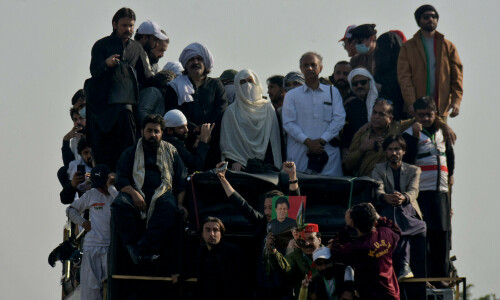
KARACHI: At least 21 bullet-riddled and tortured bodies stuffed in gunny bags were found in different parts of Karachi on Thursday as more than 30 people were killed in the city on the second day of a renewed wave of violence that police saw blended with an ‘ethnic colour’, taking the two-day death toll to nearly 50.
Thursday’s casualties that emerged as the largest single-day toll in current spree of violence left people in a state of constant fear. Despite measures promised both by the federal and provincial administrations, no credible action from the law enforcers was witnessed.
The trend of brutal incidents that emanated from the city’s south district on Wednesday evening stretched to the west on Thursday and police said victims were kidnapped and tortured before being shot dead. Their bodies were stuffed in gunny bags and dumped at various places.
Most of the victims, police said, were common wage-earners who had been kidnapped mostly on Wednesday evening while returning home from their workplaces. In some cases they were dragged off public transport.
With the latest round of abductions, torture and brutal killings, Lyari and other parts of old Karachi and its adjoining neighbourhoods have remained in grip of extreme ethnic tension. Accusations and counter accusations by various politicalgroups over the past 24 hours clearly suggest that the latest round of killings in old Karachi has very little to do with the ongoing war between Lyari’s criminal gangs.
Eyewitnesses and political observers say ethnic and political rivalries were the dominant factors behind most of the killings over the past three days. They point out that while most of those abducted and gunned down earlier in the week were pre-dominantly Lyari’s local Baloch, including footballers and a former MNA, many of those forcibly taken away and shot dead in overnight violence belonged to the Urdu- speaking community.
Allegations levelled by the PPP-backed Lyari Amn Committee and Muttahida Qaumi Movement against each other confirm that divisions during the current wave of violence in old parts of Karachi are along ethnic lines.
Alleged involvement of some Lyari gangsters in the Haqiqi-led attack on an MQM stronghold in Landhi-Malir area last month, a protest campaign by many traders of Kharadar and adjoining areas against so-called ‘protection money’, and retaliatory action by the extortionist mafia and other affected groups were also said to be factors behind the latest phase of targeted killings.
Saud Mirza, Additional IG of Sindh police, said the violence was triggered by a clash between two criminal gangs in Lyari on Wednesday evening.
“But somehow over the hours it turned into an ethnically motivated affair. We have found that criminal gangs are targeting Urdu-speaking and Baloch common men in their respective areas,” he said. He said the most affected areas were those adjacent to Lyari and pockets in trans-Lyari, including Kharadar, Meethadar, Pak Colony, Rizvia and Baldia Town, and the law enforcers were all set to launch an operation there to arrest the criminals.
The overnight scattered grenade attacks and intense firing sowed fear in the south district where residents of old city areas and Baldia Town spent a sleepless night.
In a rare admission of failure, a depressed Home Minister Manzoor Hussain Wasan said the government and law-enforcement agencies had not been able to quell violence.
“Today is not a good day for the Sindh government, police and other law-enforcement agencies,” he said while briefing the media on decisions taken at a meeting convened by the chief minister on the law and order situation.
Accompanied by provincial police chief Wajid Ali Durrani, he said: “We are quite aware of the hands behind this killing spree and disturbance and the government is well aware of its responsibility to protect the life and property of people.”He said the fresh bout of killings could be an attempt to sabotage the ongoing reconciliation talks between the Pakistan People’s Party and the MQM in Islamabad.
But the MQM alleged that “certain leaders in the government” wanted to derail the reconciliatory process between the two parties.
“President Asif Ali Zardari wants to promote the process of reconciliation in Pakistan and he wants better relations between the PPP and the MQM. The president must think what benefit the public will get from the reconciliatory process if the killing of innocent citizens continues,” MQM leader Raza Haroon said at a press conference.













































Dear visitor, the comments section is undergoing an overhaul and will return soon.